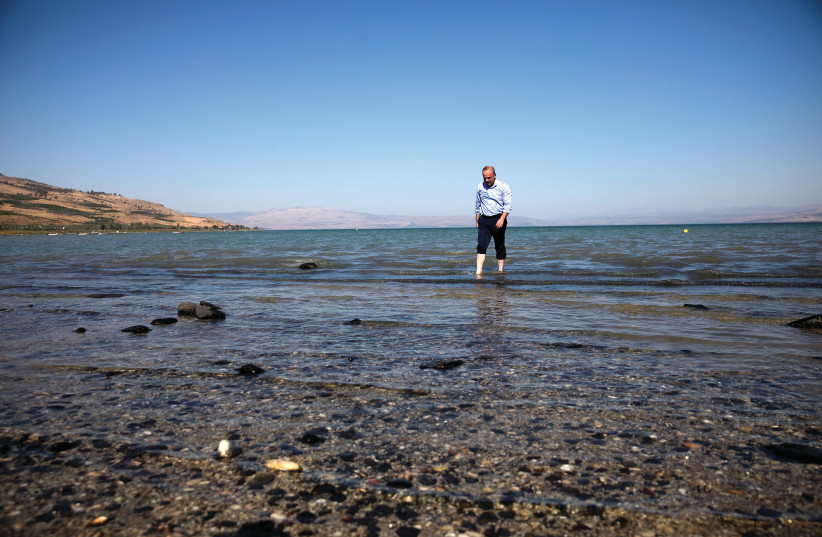Lapid is giving in to Hezbollah in the maritime border deal with Lebanon, while trying to hide its details from the public, opposition leader Benjamin Netanyahu warned on Sunday.
“Yair Lapid shamefully surrendered to [Hezbollah leader Hassan] Nasrallah’s threats,” Netanyahu stated. “He is giving Hezbollah sovereign territory of the State of Israel with a huge gas reservoir that belongs to you, the citizens of Israel.”
Netanyahu’s remarks came shortly after Lapid mentioned that the deal, mediated by US Energy Envoy Amos Hochstein, was nearly complete and would have Israel concede most of the area under dispute while receiving royalties from Total Energy, which holds the Lebanese license for gas extraction from a field that goes beyond the area of the Mediterranean Sea that is under dispute into Israeli waters.
Former energy minister Yuval Steinitz, of Netanyahu's Likud Party, said he was baffled by the apparent outcome of the negotiations.

“There was a dispute, we proposed one line and Lebanon proposed another,” Steinitz recalled. “In 2012, the US proposed that 55% [of the disputed area] go to Lebanon and 45% to Israel, both sides accepted and in the end they got cold feet. What kind of negotiation is it if they get 100% and we get zero?”
“I could understand 60-40, a third and two-thirds, but 100 and zero? That is wrong and it’s a dangerous precedent,” the former minister said.
An agreement involving Israel receiving royalties from the Kana field, which would encroach onto Israel’s side of the line, does not make up for Israel conceding the whole disputed area, Steinitz said, because no one knows with any certainty whether there is actually any gas there.

Hiding details from public?
Though Lapid said on Sunday that there will be a “discussion and authorization” of the agreement, the prime minister’s spokesperson did not specify which forum will conduct the vote, saying that it will be done according to the attorney-general’s instructions. Attorney-General Gali Baharav-Miara on Sunday said that there were ongoing productive talks between her office and the other relevant government offices regarding the impending potential maritime deal with Lebanon. However, she added that her office still has not received all the relevant facts necessary to formulate its position on the issue.
Defense Minister Benny Gantz said that while details of the deal cannot be disclosed to the public during the negotiations, the final version of the agreement will be presented to the Knesset and the main points will be presented to the public “in an orderly and transparent manner.”
In addition, a source in Lapid’s office said that the deal would likely be brought to the Knesset.
NETANYAHU ACCUSED Lapid of wanting to authorize the agreement without a debate in the Knesset and without the referendum required, according to law, if Israel gives up sovereign territory.
“Lapid has no mandate to hand over sovereign territories and sovereign assets, which belong to all of us, to an enemy state,” Netanyahu said.
If the government does not bring the agreement to the Knesset, it is “totally absurd and illegal,” Steinitz said. “Historically, agreements with Arab states have always been brought to the Knesset… even when the law didn’t require it. I can’t imagine it not being presented to the Knesset. Hezbollah will accept the deal, but not the Knesset?”
Likud MK Yariv Levin and Religious Zionist MK Orit Struck wrote to Justice Minister Gideon Sa’ar last week that the law states all international agreements must be submitted to the Knesset before a cabinet vote, and that hiding it requires the justice minister’s authorization.
"Yair Lapid shamefully surrendered to [Hezbollah leader Hassan] Nasrallah's threats."
Benjamin Netanyahu
Surrendering Israeli territory?
“We call on you to prevent this foolish step,” Struck and Levin wrote. “This is an agreement that includes concessions of Israeli sovereign territory, and of significant energy and economic capabilities.
“It would be appropriate for an interim government that does not have the trust of the Knesset not to advance this agreement at all, and certainly not to do it behind the Knesset’s back weeks before the election. We expect you to protect democracy,” they added.
Levin and Struck had yet to receive a response from Sa’ar as of Sunday.
Two Israeli organizations have already brought legal challenges against the government’s conduct related to the agreement.
The Kohelet Policy Forum petitioned the High Court of Justice arguing that the government plans to run afoul of the law requiring a referendum on concessions of sovereign territory.
Lapid argued that the Referendum Law was passed to protect Jerusalem and the Golan Heights, in an interview with Makor Rishon published on Friday.
“The argument that it also applies to a maritime border, which is an economic border that is not connected to Israeli security and sovereignty, does not legally hold water,” Lapid said.
The prime minister said he brought the question to the Attorney-General’s Office and was told that there is no need for a referendum.
Steinitz, similarly, said that economic waters are not considered sovereign territory, and as such, he also does not think a referendum is necessary according to law.
The Movement for Good Governance argued that keeping the agreement confidential is illegal and that, since the High Court required past government agreements relating to natural gas to be brought to the Knesset, this one must face parliamentary review, as well.
Anna Ahronheim and Yonah Jeremy Bob contributed to this report.
